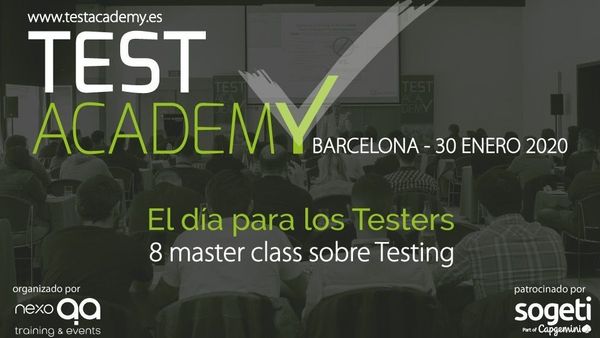Few weeks ago the Test Academy 2020 reunited part of the QA Community in Barcelona for a series of 8 Master Classes and, of course, for the usual networking. I had the chance to participate as well, which seemed to me a changed event, compared to the previous editions: up to date sessions, going one step deeper than usual into trending technologies and concepts, with something that one can take back home and apply with ease.
As my interest has grown considerably in the DevOps / Site Reliability areas recently, including Quality activities beyond production, I’ve mixed my attendance to sessions focused on those areas with ones within my current lines of activity:
“Using chaos engineering to make resilient applications in Kubernetes” by Alex Soto
I actually was pretty skeptical about joining this talk, because of my previous experiences with talks about chaos engineering: speakers overly presenting just one topic: the Chaos Monkey that made Netflix even more famous that it actually is, aaaand full stop. With absolutely nothing beyond that. I was wrong, because Alex went one step forward: digging in the roots and the needs of the concept, breaking the existing myths, sharing tips on how to approach this gradually in different working environments, both manually or using tools that automate it. What I took home from this talk is actually the confidence of being able to approach a similar project one day if I get the chance!
“What does cloud look like? Performance of Microservices in the cloud” by Almudena Vivanco
With Almudena we stepped completely away from any functional side, and had a look at 3 different architectures from a scalability and infrastructure point of view. The session was pretty dynamic, the different conversations with the public actually revealing the ups and downs of each one of them, together with the measuring points where we should focus if we’re finding ourselves within a similar architecture and within similar production trends. As my experience in Performance testing and Site Reliability at the moment is rather growing, this talk gave me a chance to view these aspects from the eyes of an experienced professional, and explore aspects of which I haven’t been involved in.
“Testing the Big Picture” by Ash Winter
The whole talk was built around Testability as the main topic of importance in designing not only architectures for the systems we build, but as well processes for working environment one might find itself in. The session was very inspiring, and pretty fun to attend to. I take back home the Joel Test and the Team Test for Testability, which in my opinion can be used in many ways: assessing by yourself a new job opportunity (something I’ve already applied!), as a change management tool for development teams or within upper tech management.
“Development of Selenium tests with JUnit 5 and Docker” by Boni Garcia
No doubts that Boni Garcia is a craftsman. I was already familiar with his webdrivermanager java dependency that I’ve used for a couple of past projects, and I was pretty curious about this particular talk. We’ve looked at his new tool, selenium-jupiter, which wrapps up selenium, junit5 and docker, and makes setting up a test automation framework a piece of cake. In the last couple of years I was rather involved in testing UIs via different JS frameworks, so this session was a refresh for me of the advantages of using Java over the wide palette of JS UI testing tools, and also of the challenges that it brings along.
Apart from the Master Classes, there was a rather small area with Stands, of the organizer and the main sponsor. I think for a smaller event like this, aimed at gathering up a community from a specific location, there is quite a potential of improvement in this aspect, as these stands can trigger even more conversations between the participants, and can inspire people to even do take on new job challenges. One of the best parts of attending Test Academy is also getting the chance to see and say hi to ex-colleagues, QAs you met in other similar events and to check the pulse of the local QA Community.


Comments are closed, but trackbacks and pingbacks are open.